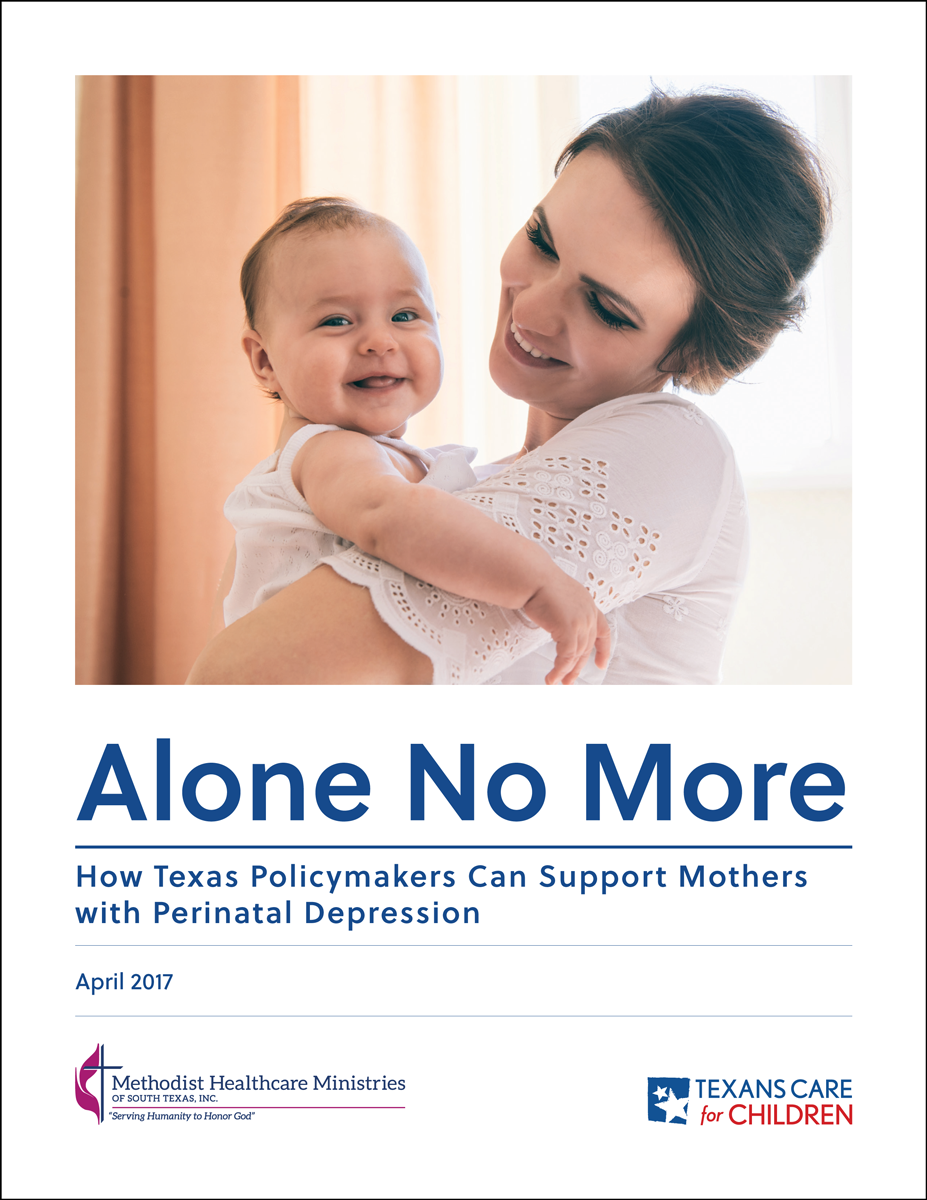For Immediate Release
CONTACT: Peter Clark, 512-417-9262

AUSTIN – A new report released today outlines 10 steps that Texas leaders should take to support mothers suffering from perinatal depression and ensure children get off to a healthy, successful start. The report by Texans Care for Children notes that perinatal depression – also referred to as postpartum depression, maternal depression, or perinatal mood and anxiety disorders – is one of the most common complications of pregnancy, affecting approximately one in six new mothers in Texas. The report shows that approximately half of all cases of perinatal depression go undetected and undiagnosed, a challenge that bills currently before the Texas Legislature would address.
“By taking these steps, state leaders can help Texas moms and babies get on a healthier path during this critical time in a child’s development,” said Adriana Kohler, Senior Health Policy Associate at Texans Care for Children. “We’re glad to see a bipartisan effort in the Legislature to give moms the support they need to be healthy and raise healthy kids.”
The issue has gained momentum in Texas after Governor Greg Abbott made it the first recommendation in his 2014 campaign’s health care plan, a state task force reported on a recent spike in pregnancy-related deaths among Texas mothers, and the Texas House Mental Health Committee called for action on postpartum depression.
Tomorrow, April 4th, the House Public Health Committee will hold a hearing on three bills to address postpartum depression, including HB 2466, a bill by Representative Sarah Davis to address the first recommendation made in the Texans Care for Children report. The legislation would provide more mothers with the option to be screened for maternal depression during their baby’s well-check visit with a pediatrician or other primary care provider. Pediatricians and other primary care providers frequently interact with mothers during a child’s first year of life and play a vital role in detecting perinatal depression early. The American Academy of Pediatrics and the Centers for Medicare and Medicaid Services recommend that pediatricians conduct the screening because it directly benefits the health and development of a baby. When pediatricians see babies covered by Medicaid or CHIP, the bill under consideration in the Texas Legislature would allow them to bill the insurance company for the depression screening. Improving screening opportunities is particularly important because approximately half of all cases of perinatal depression go undetected and undiagnosed. Early detection helps identify the signs and symptoms of perinatal depression before it gets worse or costlier to treat. Senator Joan Huffman has filed a companion bill in the Senate.
The hearing will also include legislation by Rep. Garnet Coleman (HB 2135) to provide postpartum depression coverage through Medicaid for one year after the birth of a child and legislation by Rep. Jessica Farrar (HB 2604) requiring HHSC to develop a strategic plan to improve access to postpartum depression screening, referral, treatment, and support services.
Perinatal depression can begin during pregnancy, weeks after childbirth, or up to a year after the birth of a child. A new mother may face crippling anxiety, feelings of shame and hopelessness, and major depressive episodes as she is trying to bond with her newborn, settle into a feeding routine, and help her baby grow and play. If untreated, perinatal depression can have devastating effects on families. Parents may be less likely to implement injury prevention measures, such as putting their baby on her back to sleep. Children may be more likely to experience developmental delays, such as delays in language and brain development. Early screening and treatment of perinatal depression is critical for a mother’s health and a child’s health, brain development, and ability to succeed in school.
Besides undermining the health of mothers and babies, the report notes that failure to screen for and treat perinatal depression leads to other costs. For example, women suffering from perinatal depression are four times more likely to go to a hospital emergency room. They also incur 90 percent higher health care expenditures. Children of mothers with untreated perinatal depression are more likely to be hospitalized for preventable conditions such as untreated asthma.
The following recommendations are included in the report:
Early Detection of Perinatal Depression
- Enact policy to allow pediatricians and other primary care providers to bill for screening mothers for perinatal depression during a child’s Medicaid or Children’s Health Insurance Plan (CHIP) well- baby visit.
- Equip health care providers with better tools by establishing an online education module on perinatal depression screening and directing Medicaid managed care organizations (MCOs) to work with providers to identify referral options for mental health care in their service area.
- Eliminate current coding and procedural issues that impede health providers from conducting perinatal depression screening and counseling for adult women enrolled in Medicaid for Pregnant Women.
- Eliminate coding and procedural issues that impede providers from conducting perinatal depression screening and counseling for teens and adult women enrolled in Healthy Texas Women or the Family Planning Program.
Referrals to Care and Training Opportunities to Better Support Moms
- Create a website for Texas providers and families that identifies mental health professionals, provides referral information, and identifies other programs that support parents, such as Texas’ Home Visiting programs.
- Increase training opportunities for clinicians and non-clinicians to learn about best practices for identifying and supporting women facing perinatal depression, including resources on making referrals to clinical and other support services.
Access to Care and Treatment
- Apply for federal grants available to states under the 21st Century Cures Act to support screening, referral, and treatment of perinatal depression.
- Increase access to perinatal depression services within Local Mental Health Authorities (LMHAs) and community health centers.
- Increase access to community-based doula services for underserved women.
- Improve access to affordable health insurance coverage for families.
###



